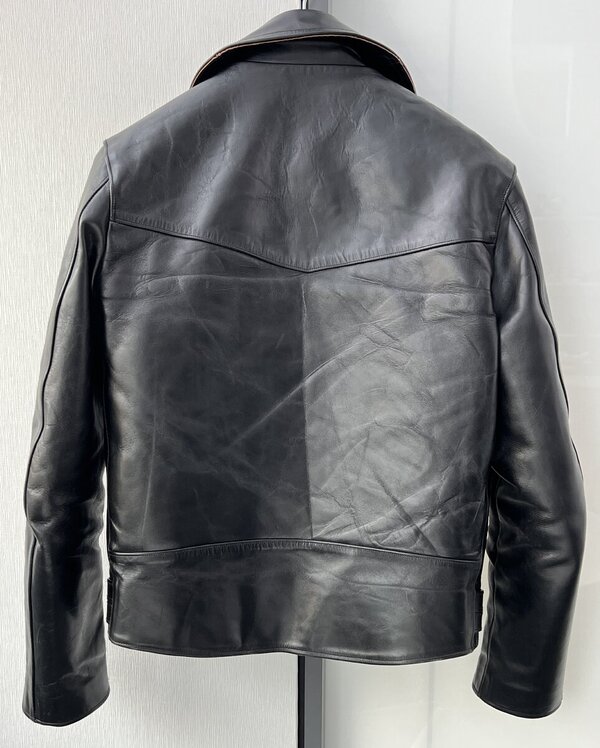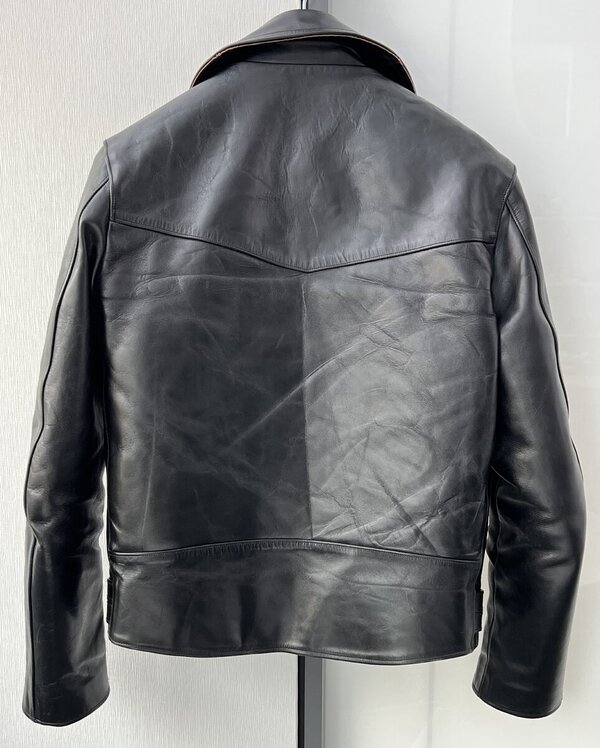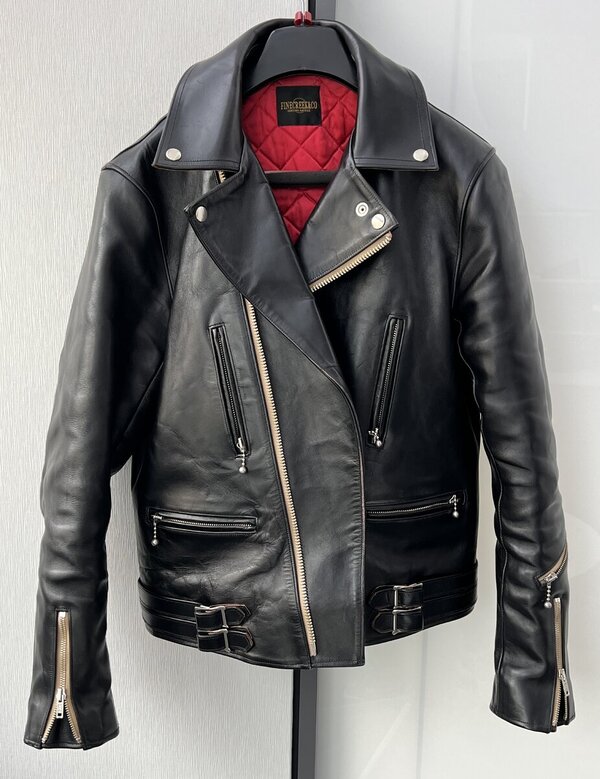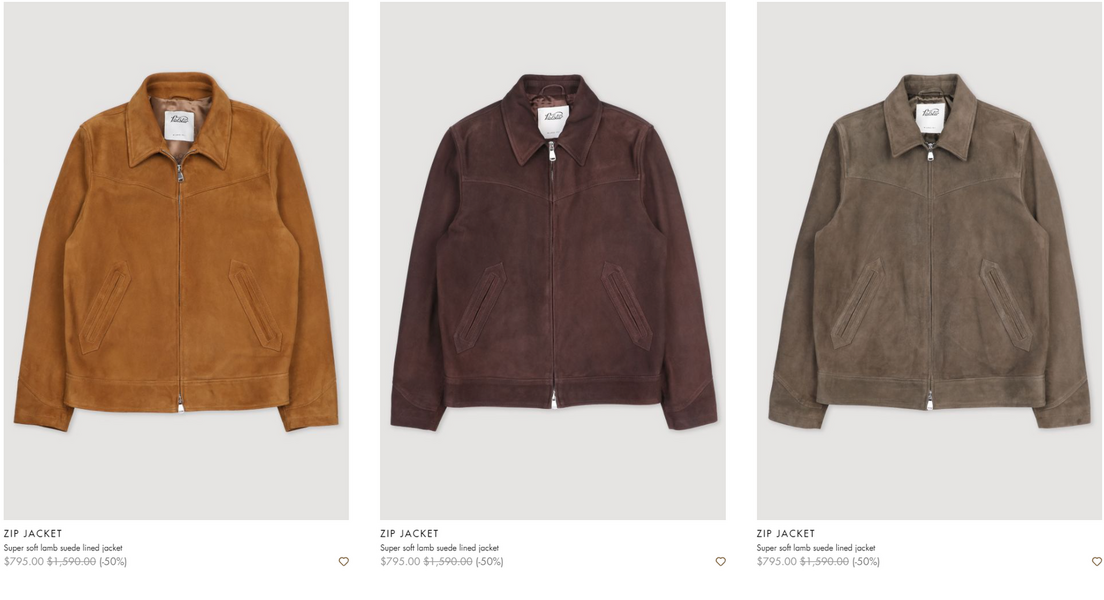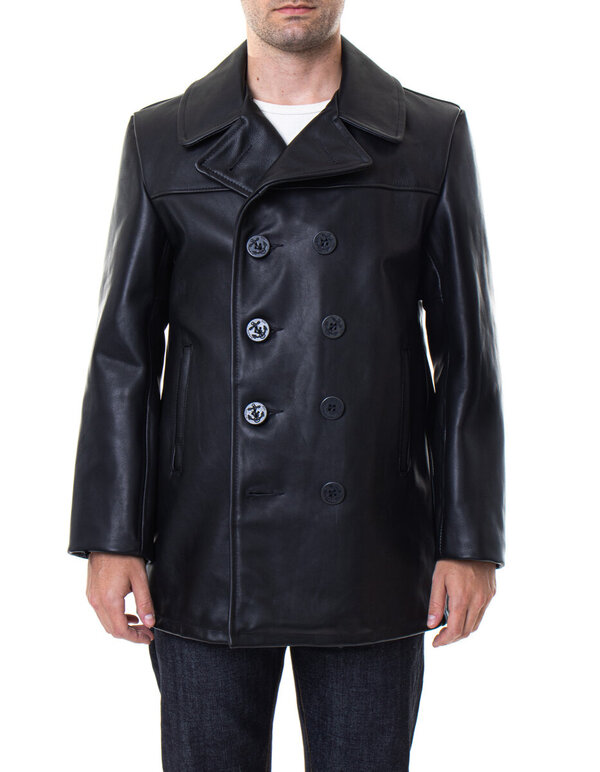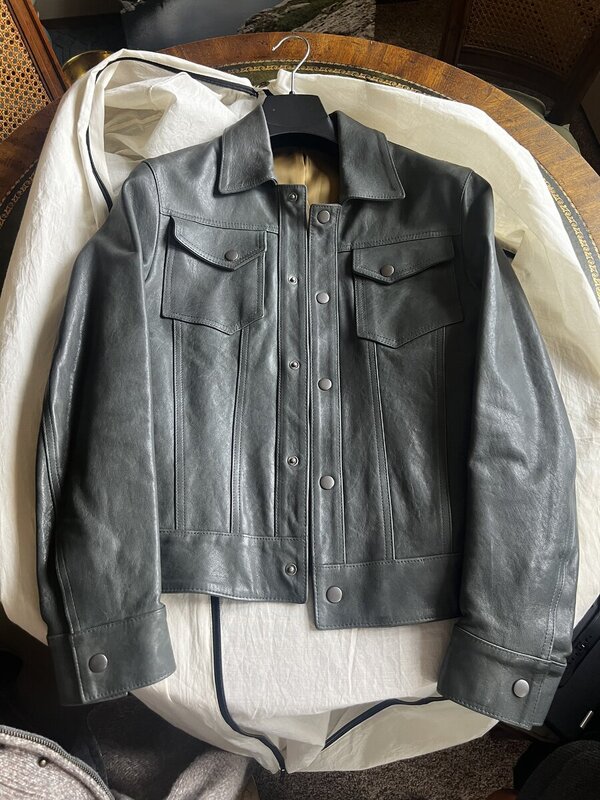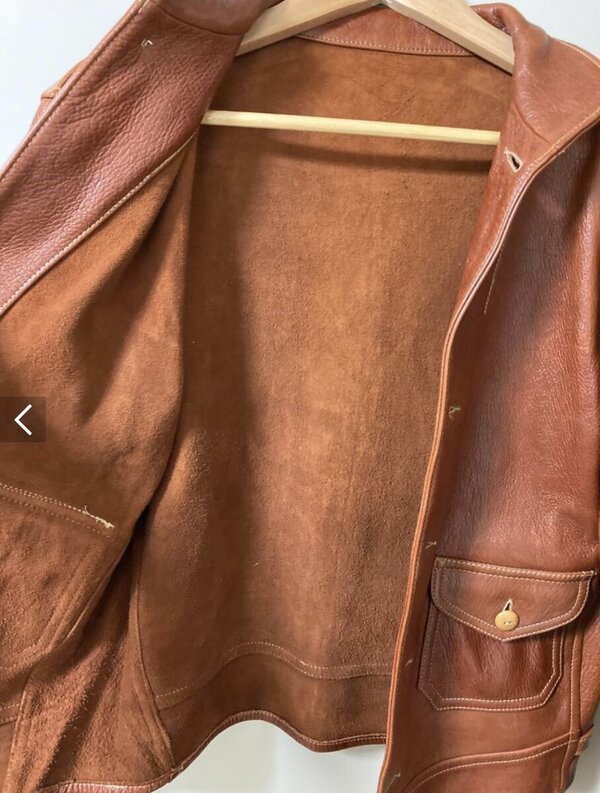Support the forum
Navigation
-
- Men's Style
- Classic Menswear
- Streetwear and Denim
- Preorders, Group Made-to-order, trunk shows, and o
- Menswear Advice
- Former Affiliate Vendor Threads; a Locked Forum.
- Career and job listings in fashion, mens clothing,
-
- American Trench
- AMIDÉ HADELIN
- Archibald London
- The Armoury
- Arterton
- Besnard
- Canoe Club
- Capra Leather
- Carmina
- Cavour
- Crush Store
- De Bonne Facture
- Drinkwater's Cambridge
- Drop93
- eHABERDASHER
- Enzo Custom
- Epaulet
- Exquisite Trimmings
- Fils Unique
- Gentlemen's Footwear
- Giin
- Grant Stone
- House of Huntington
- IsuiT
- John Elliott
- Jonathan Abel
- Kent Wang
- Kirby Allison
- Larimars Clothing
- Lazy Sun
- LuxeSwap
- Luxire Custom Clothing
- Nicks Boots
- No Man Walks Alone
- Once a Day
- Passus shoes
- Proper Cloth
- SARTORIALE
- SEH Kelly
- Self Edge
- Shop the Finest
- Skoaktiebolaget
- Spier and MacKay
- Standard and Strange
- Bespoke Shoemaker Szuba
- Taylor Stitch
- TLB Mallorca
- UNI/FORM LA
- Vanda Fine Clothing
- Von Amper
- Wrong Weather
- Yeossal
- Zam Barrett
Install the app
More options
-
Hi, I am the owner and main administrator of Styleforum. If you find the forum useful and fun, please help support it by buying through the posted links on the forum. Our main, very popular sales thread, where the latest and best sales are listed, are posted HERE
Purchases made through some of our links earns a commission for the forum and allows us to do the work of maintaining and improving it. Finally, thanks for being a part of this community. We realize that there are many choices today on the internet, and we have all of you to thank for making Styleforum the foremost destination for discussions of menswear. -
This site contains affiliate links for which Styleforum may be compensated.
-
STYLE. COMMUNITY. GREAT CLOTHING.
Bored of counting likes on social networks? At Styleforum, you’ll find rousing discussions that go beyond strings of emojis.
Click Here to join Styleforum's thousands of style enthusiasts today!
Styleforum is supported in part by commission earning affiliate links sitewide. Please support us by using them. You may learn more here.
You are using an out of date browser. It may not display this or other websites correctly.
You should upgrade or use an alternative browser.
You should upgrade or use an alternative browser.
Leather Jackets: Post Pictures of the Best You've Seen/Owned?
- Thread starter RatherAnOddball
- Start date
- Watchers 1,259
- Joined
- Apr 10, 2011
- Messages
- 27,320
- Reaction score
- 69,990
Err ....
Others are just acting like little ***** which in certain you are. Try having a discussion without insults or name calling.
Err ....
sinnedk
Stylish Dinosaur
- Joined
- Nov 15, 2010
- Messages
- 17,108
- Reaction score
- 5,116
Ya damn didn't proof read, should of but am on mobile.
Anyways I'm done with this conversation.
Err ....
Ya damn didn't proof read, should of but am on mobile.
Anyways I'm done with this conversation.
- Joined
- Nov 24, 2014
- Messages
- 17,129
- Reaction score
- 17,691
i haven't posted in this thread for awhile but i have thought about this very issue for awhile:
anytime you have a scarce natural resource where a market price encourages poaching is, to me, unethical to consume. take brazilian rosewood as an example: in acoustic guitars it's considered a super premium material anymore due to it's tonal character and rarity (it was more or less the standard bearer until supply ran out in the 1950s, when the industry switched to indian rosewood - superficially similar tonally and aesthetically but it's just not the same product).
nowadays it's basically an international crime to take any new material from the wild and yet golden era guitars command a premium. adding to that there are pre-ban stocks of raw boards in luthiers shops and factories and these new instruments, when introduced to market, command ridiculous prices. is it likely that the scenario is enticing to poachers to bootleg rosewood? without citation, i'm pretty sure that yes, it does happen.
and, logically, if it does happen it's only because the market has set a price. without market transparency - that is, without market prices expressing demand - there would be no way for poachers to know whether it's worth the risk for bootlegging those materials. in short, even if you buy a "pre-ban" specimen, the price is set and so is the motivation for bootlegging. in terms of practical environmental outcomes, as far as i am concerned you might as well buy directly from a poacher.
[ironically, this same process is destined to repeat itself with the substitute material - indian rosewood. which makes me to an extent complicit in futuro since my instruments are not made of renewable or waste materials (incidentally this is entirely possible - the Martin SWOMGT is a fabulous model and not made of scarce resources from the 3rd world)]
to be clear, this is simply my own brief meditation on the ethics of resource management and consumption. it's a free world and people will do what they will.
anytime you have a scarce natural resource where a market price encourages poaching is, to me, unethical to consume. take brazilian rosewood as an example: in acoustic guitars it's considered a super premium material anymore due to it's tonal character and rarity (it was more or less the standard bearer until supply ran out in the 1950s, when the industry switched to indian rosewood - superficially similar tonally and aesthetically but it's just not the same product).
nowadays it's basically an international crime to take any new material from the wild and yet golden era guitars command a premium. adding to that there are pre-ban stocks of raw boards in luthiers shops and factories and these new instruments, when introduced to market, command ridiculous prices. is it likely that the scenario is enticing to poachers to bootleg rosewood? without citation, i'm pretty sure that yes, it does happen.
and, logically, if it does happen it's only because the market has set a price. without market transparency - that is, without market prices expressing demand - there would be no way for poachers to know whether it's worth the risk for bootlegging those materials. in short, even if you buy a "pre-ban" specimen, the price is set and so is the motivation for bootlegging. in terms of practical environmental outcomes, as far as i am concerned you might as well buy directly from a poacher.
[ironically, this same process is destined to repeat itself with the substitute material - indian rosewood. which makes me to an extent complicit in futuro since my instruments are not made of renewable or waste materials (incidentally this is entirely possible - the Martin SWOMGT is a fabulous model and not made of scarce resources from the 3rd world)]
to be clear, this is simply my own brief meditation on the ethics of resource management and consumption. it's a free world and people will do what they will.
Trit
Senior Member
- Joined
- Jul 19, 2010
- Messages
- 325
- Reaction score
- 401
Why are we saying the jacket doesn't look good? I like it.
I remember hearing as a kid that elephant skin is thicker than a piece of bread. How can it even be worn? Not full grain, right? Like just the top-most layer?
I remember hearing as a kid that elephant skin is thicker than a piece of bread. How can it even be worn? Not full grain, right? Like just the top-most layer?
Last edited:
akatsuki
Distinguished Member
- Joined
- Apr 5, 2008
- Messages
- 2,652
- Reaction score
- 201
Yep. Glamorizing elephant hides isn't directly supporting the poaching of them. Not at all.
Some people are deliberately obtuse and will do whatever they want regardless. So I think the Trump comparison is also pretty apt.
But whatever. Nobody is going to change their mind on an Internet argument.
Some people are deliberately obtuse and will do whatever they want regardless. So I think the Trump comparison is also pretty apt.
But whatever. Nobody is going to change their mind on an Internet argument.
vodkaislove
Member
- Joined
- May 7, 2016
- Messages
- 18
- Reaction score
- 15
In south africa, park ranger culls elephant in order to protect the ecosystem. Im pretty sure thats where leather suppliers sourced the hides from. The reserve gets another source of income, while gothninja gets cool jacket. Seem like a win-win to me
ridethecliche
Stylish Dinosaur
- Joined
- Aug 14, 2013
- Messages
- 10,154
- Reaction score
- 3,867
If the story checks out and there's paperwork to prove it, then rock on.
notwithit
Pullup laureate
- Joined
- Mar 2, 2010
- Messages
- 8,556
- Reaction score
- 6,527
I think there are multiple at play here, and there aren't necessarily clear-cut answers. The first set of issues is related to the acquisition of the hide and the origin of the jacket, the second set is related to the consequences of this jacket's existence.
The origin is about as defensible as it can get. Sure, people can say "but you don't know for absolute 100% sure and someone might have had their fingers crossed behind their back at some point during the exchange" and stuff that boils down to I don't trust Africa because they're not America, but beyond that, it's relatively bulletproof origin story. The animal was killed under appropriate circumstances and was not killed for its skin or other products. You can still object to wearing animal hides in general on moral grounds, but whatever.
The next set of issues relates to the potential consequences of making and owning of the jacket. If the object was something made of ivory, I think it's easy to make a moral argument against purchasing and wearing it. There's a significant illicit trade in ivory fueled by high demand and supplied by poaching and smuggling. As far as I know, there's no intrinsic value or utility to ivory as a material; it's valuable because people say it's valuable. Kind of like how diamonds are mostly useless, but people still get their hands cut off for that ****. In that regard, humane ivory (or whatever you want to call ivory that was acquired by non-poaching means) and blood-free diamonds are still part of a trade whose basis is in criminal activity, violence, and murder, even if your diamonds are fair-trade, shade-grown, non-GMO, &c.
The skin of the elephant is a little different. There's no significant illicit trade in elephant hides. Governments don't go burning stocks of them to take them off the market. Poachers kill elephants, take their tusks, and largely leave them to rot. Similarly, there may be some use for the rock or dirt or whatever surrounding the diamonds, but people generally just take the diamonds and leave the rest where it is.
If we can accept that there isn't currently enough demand for elephant hides to lead to poaching elephants for their hides - or even make it worthwhile for most ivory poachers to try to take the hides with them - there's the question of whether the existence of an elephant hide jacket could actually drive demand for more elephant hide jackets. I think the answer here is maybe. Imagine if Kanye West wore an elephant hide jacket tomorrow. KTT would be all over that ****. They'd probably go kill their own elephants, sneaking into zoos late at night with backpacks full of elephant poison or elephant glue traps or whatever.
No offense to @skeen7908, but skeen7908 is not Kanye West (I don't think, and apologies if I'm wrong about that). One guy wearing one idiosyncratic jacket is unlikely to create an entire trade around a material that's been pretty much ignored as a commodity the entire time it's been available, barring some truly unlikely and bizarre circumstances. Let's say that purchasing and wearing the jacket isn't necessarily immoral in the sense of having negative consequences - or at least negative consequences that are in any way likely to transpire - but there are circumstances under which an individual wielding significant cultural capital could create negative consequences by irresponsibly promoting the elephant hide without drawing equal attention to the circumstances under which it was acquired.
The last question in my mind is whether wearing this elephant hide, while not necessarily immoral, is in poor taste. To that I say a strong "maybe". I'm fairly certain that I wouldn't want to wear it, but that doesn't necessarily mean I'd condemn someone who does.
The origin is about as defensible as it can get. Sure, people can say "but you don't know for absolute 100% sure and someone might have had their fingers crossed behind their back at some point during the exchange" and stuff that boils down to I don't trust Africa because they're not America, but beyond that, it's relatively bulletproof origin story. The animal was killed under appropriate circumstances and was not killed for its skin or other products. You can still object to wearing animal hides in general on moral grounds, but whatever.
The next set of issues relates to the potential consequences of making and owning of the jacket. If the object was something made of ivory, I think it's easy to make a moral argument against purchasing and wearing it. There's a significant illicit trade in ivory fueled by high demand and supplied by poaching and smuggling. As far as I know, there's no intrinsic value or utility to ivory as a material; it's valuable because people say it's valuable. Kind of like how diamonds are mostly useless, but people still get their hands cut off for that ****. In that regard, humane ivory (or whatever you want to call ivory that was acquired by non-poaching means) and blood-free diamonds are still part of a trade whose basis is in criminal activity, violence, and murder, even if your diamonds are fair-trade, shade-grown, non-GMO, &c.
The skin of the elephant is a little different. There's no significant illicit trade in elephant hides. Governments don't go burning stocks of them to take them off the market. Poachers kill elephants, take their tusks, and largely leave them to rot. Similarly, there may be some use for the rock or dirt or whatever surrounding the diamonds, but people generally just take the diamonds and leave the rest where it is.
If we can accept that there isn't currently enough demand for elephant hides to lead to poaching elephants for their hides - or even make it worthwhile for most ivory poachers to try to take the hides with them - there's the question of whether the existence of an elephant hide jacket could actually drive demand for more elephant hide jackets. I think the answer here is maybe. Imagine if Kanye West wore an elephant hide jacket tomorrow. KTT would be all over that ****. They'd probably go kill their own elephants, sneaking into zoos late at night with backpacks full of elephant poison or elephant glue traps or whatever.
No offense to @skeen7908, but skeen7908 is not Kanye West (I don't think, and apologies if I'm wrong about that). One guy wearing one idiosyncratic jacket is unlikely to create an entire trade around a material that's been pretty much ignored as a commodity the entire time it's been available, barring some truly unlikely and bizarre circumstances. Let's say that purchasing and wearing the jacket isn't necessarily immoral in the sense of having negative consequences - or at least negative consequences that are in any way likely to transpire - but there are circumstances under which an individual wielding significant cultural capital could create negative consequences by irresponsibly promoting the elephant hide without drawing equal attention to the circumstances under which it was acquired.
The last question in my mind is whether wearing this elephant hide, while not necessarily immoral, is in poor taste. To that I say a strong "maybe". I'm fairly certain that I wouldn't want to wear it, but that doesn't necessarily mean I'd condemn someone who does.
Last edited:
omgcookielol
Senior Member
- Joined
- Apr 11, 2011
- Messages
- 592
- Reaction score
- 461
Quick picture of my custom d-pocket made by Johnson Leathers in San Francisco - phone pic sorry.
Forest green 3.5 (to 4?) oz aniline cowhide, talon zips throughout. Removable black shearling collar.
The talon hardware is super shiny silver - it only looks brassy from all of the reflection. Leather's a lot darker too - very rich, deep forest green color.
Hands down the best leather jacket I've ever owned.

Forest green 3.5 (to 4?) oz aniline cowhide, talon zips throughout. Removable black shearling collar.
The talon hardware is super shiny silver - it only looks brassy from all of the reflection. Leather's a lot darker too - very rich, deep forest green color.
Hands down the best leather jacket I've ever owned.
Last edited:
sinnedk
Stylish Dinosaur
- Joined
- Nov 15, 2010
- Messages
- 17,108
- Reaction score
- 5,116
Very well written, good post man. I completely agree with it and it is definitely a grey area.
I think there are multiple at play here, and there aren't necessarily clear-cut answers. The first set of issues is related to the acquisition of the hide and the origin of the jacket, the second set is related to the consequences of this jacket's existence.
The origin is about as defensible as it can get. Sure, people can say "but you don't know for absolute 100% sure and someone might have had their fingers crossed behind their back at some point during the exchange" and stuff that boils down to I don't trust Africa because they're not America, but beyond that, it's relatively bulletproof origin story. The animal was killed under appropriate circumstances and was not killed for its skin or other products. You can still object to wearing animal hides in general on moral grounds, but whatever.
The next set of issues relates to the potential consequences of making and owning of the jacket. If the object was something made of ivory, I think it's easy to make a moral argument against purchasing and wearing it. There's a significant illicit trade in ivory fueled by high demand and supplied by poaching and smuggling. As far as I know, there's no intrinsic value or utility to ivory as a material; it's valuable because people say it's valuable. Kind of like how diamonds are mostly useless, but people still get their hands cut off for that ****. In that regard, humane ivory (or whatever you want to call ivory that was acquired by non-poaching means) and blood-free diamonds are still part of a trade whose basis is in criminal activity, violence, and murder, even if your diamonds are fair-trade, shade-grown, non-GMO, &c.
The skin of the elephant is a little different. There's no significant illicit trade in elephant hides. Governments don't go burning stocks of them to take them off the market. Poachers kill elephants, take their tusks, and largely leave them to rot. Similarly, there may be some use for the rock or dirt or whatever surrounding the diamonds, but people generally just take the diamonds and leave the rest where it is.
If we can accept that there isn't currently enough demand for elephant hides to lead to poaching elephants for their hides - or even make it worthwhile for most ivory poachers to try to take the hides with them - there's the question of whether the existence of an elephant hide jacket could actually drive demand for more elephant hide jackets. I think the answer here is maybe. Imagine if Kanye West wore an elephant hide jacket tomorrow. KTT would be all over that ****. They'd probably go kill their own elephants, sneaking into zoos late at night with backpacks full of elephant poison or elephant glue traps or whatever.
No offense to @skeen7908, but skeen7908 is not Kanye West (I don't think, and apologies if I'm wrong about that). One guy wearing one idiosyncratic jacket is unlikely to create an entire trade around a material that's been pretty much ignored as a commodity the entire time it's been available, barring some truly unlikely and bizarre circumstances. Let's say that purchasing and wearing the jacket isn't necessarily immoral in the sense of having negative consequences - or at least negative consequences that are in any way likely to transpire - but there are circumstances under which an individual wielding significant cultural capital could create negative consequences by irresponsibly promoting the elephant hide without drawing equal attention to the circumstances under which it was acquired.
The last question in my mind is whether wearing this elephant hide, while not necessarily immoral, is in poor taste. To that I say a strong "maybe". I'm fairly certain that I wouldn't want to wear it, but that doesn't necessarily mean I'd condemn someone who does.
Very well written, good post man. I completely agree with it and it is definitely a grey area.
bebop d
Alpha-M
- Joined
- Feb 2, 2012
- Messages
- 399
- Reaction score
- 173
Very well written, good post man. I completely agree with it and it is definitely a grey area.
And a grey jacket. And it would seem a grey elephant. Can we now move back to the original subject of this thread?
vodkaislove
Member
- Joined
- May 7, 2016
- Messages
- 18
- Reaction score
- 15
Or we can keep talking about the elephant in the room
And a grey jacket. And it would seem a grey elephant. Can we now move back to the original subject of this thread?
Or we can keep talking about the elephant in the room
Streetwear Featured products
-
Americana - 60th Anniversary Sale! Fashioned after the classic service boot style, the Americana offers a timeless look on the HNW Last. This boot is built on the same last and has the same heel height as the Falcon.
-
CASABLANCA Raijo Sunglasses Gold/Brown - $305 The Rajio is an aviator-shaped frame in green acetate with metal details in 18k Yellow gold. Temples and end-pieces have the iconic Casablanca branding and wave detail that is a nod to the Memphis movement.
-
John Elliott - 24 hr FLASH SALE The John Elliott Spring Sale is live. Take up to 50% off select styles + Stay tuned for Flash Sale events throughout the sale period
Latest posts
- Replies
- 0
- Views
- 1
- Replies
- 4,609
- Views
- 839,222
- Replies
- 25,929
- Views
- 3,804,594
- Replies
- 25,756
- Views
- 5,122,063
- Replies
- 23,357
- Views
- 1,502,399
Featured Sponsor
Forum Sponsors
- American Trench
- AMIDÉ HADELIN
- Archibald London
- The Armoury
- Arterton
- Besnard
- Canoe Club
- Capra Leather
- Carmina
- Cavour
- Crush Store
- De Bonne Facture
- Drinkwater's Cambridge
- Drop93
- eHABERDASHER
- Enzo Custom
- Epaulet
- Exquisite Trimmings
- Fils Unique
- Gentlemen's Footwear
- Giin
- Grant Stone
- House of Huntington
- IsuiT
- John Elliott
- Jonathan Abel
- Kent Wang
- Kirby Allison
- Larimars Clothing
- Lazy Sun
- LuxeSwap
- Luxire Custom Clothing
- Nicks Boots
- No Man Walks Alone
- Once a Day
- Passus shoes
- Proper Cloth
- SARTORIALE
- SEH Kelly
- Self Edge
- Shop the Finest
- Skoaktiebolaget
- Spier and MacKay
- Standard and Strange
- Bespoke Shoemaker Szuba
- Taylor Stitch
- TLB Mallorca
- UNI/FORM LA
- Vanda Fine Clothing
- Von Amper
- Wrong Weather
- Yeossal
- Zam Barrett
Members online
- mebiuspower
- GoldenHarvestMedal
- serbarristan
- Dora2300
- Texasmade
- gorf
- elbowtron
- bassted
- Catullus
- jtwo
- RFHansen
- MJMcRibb
- circumspice
- mesh_phd
- Jr Mouse
- philosophe
- VaderDave
- Newcomer
- WhyUEarly
- hdub
- XxLogo
- Brantley11
- jazerad
- ojaw
- WatchesCars
- thebeanieking
- tomsocal
- ramdomthought
- Draizien
- LA Guy
- panchley
- kakishiboo
- Lendo
- Numbernine
- Roikins
- Using Technology
- highwindows
- Legerdemain
- grio1212
- JayDotz
- _AMD
- CLH03
- suitforcourt
- ricecube
- nets860
- iluvatar
- Timbaland
- TestaRossa888
- blewnote1
- Omega Male
Total: 1,702 (members: 89, guests: 1,613)
